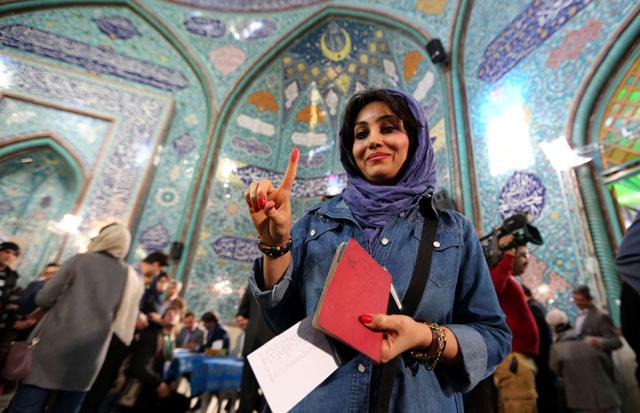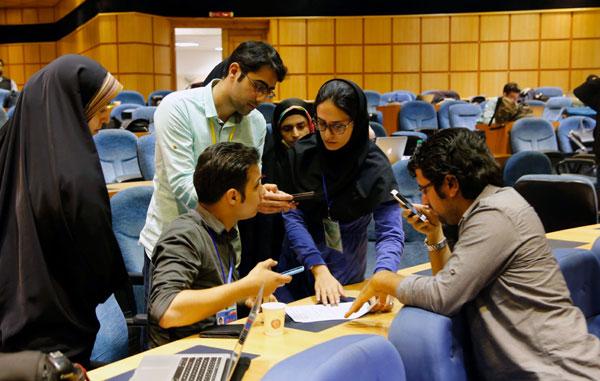You are here
Rouhani, moderates make gains in high-stakes Iran votes
By Reuters - Feb 27,2016 - Last updated at Feb 28,2016

An Iranian woman shows her inked finger after casting her ballot at a polling station in Tehran, on Friday (AFP photo)
TEHRAN — President Hassan Rouhani won a resounding vote of support and his moderate allies made a strong showing in high-stakes elections that could speed Iran's post-sanctions opening to the world, according to early partial results on Saturday.
Tens of millions thronged polling stations on Friday for a twin vote to the 290-seat parliament and the 88-member Assembly of Experts, which selects the country's highest authority, the supreme leader.
An initial tally of 1.5 million votes counted in Tehran — fewer than one-fifth of the capital's eligible voters — showed Rouhani and his pragmatic ally, ex-president Akbar Hashemi Rafsanjani, leading the race for the Assembly of Experts, according to Interior Ministry figures.
Reformists and moderates also seemed set to make big gains against Islamic hardliners in parliament. The twin poll was seen by analysts as a potential turning point for Iran, where nearly 60 per cent of the 80 million population is under 30.
The elections were the first since a landmark nuclear deal last year that led to the removal of most of the sanctions that have damaged the economy over the past decade.
Supporters of Rouhani, who championed the nuclear deal, were pitted against hardliners close to Supreme Leader Ayatollah Ali Khameni, who are deeply wary of detente with Western countries. The conservative Guardian Council had restricted both races by disqualifying most reformist and many moderate candidates.
However, of the top contenders for Tehran's 16 Assembly of Experts seats, the partial count showed 13 were members of a list led by Rouhani and Rafsanjani, though some were consensus candidates also backed by hardliners.
The three most prominent hardliners received lesser scores: Ahmad Jannati was 10th, the assembly's current chairman Mohammad Yazdi came 12th, and arch-conservative Mohammad-Taghi Mesbah-Yazdi was teetering on the edge in 16th place.
Preliminary results of the parliamentary poll carried by the semi-official Fars and Mehr News agencies indicated reformists and independents linked to them were leading so far against hardliners in several cities.
Even if reformists do not emerge with a majority in the legislature, dominated since 2004 by conservatives, analysts say they will secure a bigger presence than before.
A Reuters tally, based on official results published so far, suggested the pro-Rouhani camp and allied independents were leading in the parliamentary vote. Some moderate conservatives, including current speaker Ali Larijani, support Rouhani.
Of the first 61 seats declared, 18 went to hardliners, 17 to reformists, 12 to independents and 14 will be decided in run-offs in late April because no candidate won the required 25 per cent of votes cast. Five of the initial winners were women.
Interior Minister Abdolreza Rahmani Fazli told state television results for Tehran’s 30 parliament seats would be announced on Saturday evening.
Conservatives usually perform well in the countryside while young town-dwellers tend to prefer moderate candidates.
High reformist hopes
Reformists seeking more social and economic freedoms and diplomatic engagement voiced high hopes of expanding their sway in parliament and easing conservative clerics’ grip on the experts’ assembly.
Saeed Leylaz, a political analyst and economist who served as an adviser to former president Mohammad Khatami, said initial indications were beyond reformist expectations.
“It seems the number of candidates who belong to the reformist and independent groups will be the majority in parliament and I am hopeful that the new parliament, will be perfect for us,” he told Reuters.
“In the Assembly of Experts our initial expectation was 15 to 20 per cent but it seems it will be beyond that.”
Rafsanjani, 81, a prominent leader ever since Iran’s 1979 Islamic revolution, called for national unity now the divisive campaign was over.
“The competition is over and the phase of unity and cooperation has arrived,” state news agency IRNA quoted him as saying. “The time after elections is the time for hard work to build the country.”
Asked by Reuters on Friday what would happen if reformists did not win, he said: “It will be a major loss for the Iranian nation.”
Newspapers hailed what they saw as a huge turnout, including many young voters. Polling was extended five times for a total of almost six extra hours because so many people wanted to vote.
Iran’s Financial Tribune newspaper said 3 million first-time voters were among the nearly 55 million people aged 18 and over who are eligible to cast ballots.
Interior Ministry spokesman Hosseinali Amiri said more than 33 million votes had been cast, but that tally was not final. It would probably take three days to count all the votes, he said.
Mehr news agency published a list of both official and unofficial parliamentary winners so far, breaking down their affiliation as 82 conservative, 49 reformist and 71 independent.
Mousavi votes
Authorities had promised that all Iranians would be able to vote and on Friday opposition leader Mir Hossein Mousavi and his wife voted for the first time since being put under house arrest in 2011, an ally of Mousavi’s told Reuters.
Among voters in Khorasan Square, a working class neighbourhood in Tehran, on Friday, Mahnaz Mehri, a 52-year-old mother of four, said she was voting for reformists because they had a better vision for the economy and foreign policy.
In Meydan Beheshti Square, a mainly conservative neighbourhood, Reza Ganjialilu, a 28-year-old employee at an electronics shop said he did not favour the reformists.
“I have a duty to my country. This group of people [conservatives] is the best. Our main concern is preserving our religion, ideology, not just the economy,” he said.
Iran, which has the world’s second-largest gas reserves, a diversified manufacturing base and an educated workforce, is seen by global investors as a huge emerging market opportunity, in everything from cars to airplanes and railways to retail.
For ordinary Iranians, the prospect of this kind of investment holds out the promise of a return to economic growth, better living standards and more jobs in the long run.
An opening to the world of this scale — and Rouhani’s popularity — have alarmed hardline allies of Khamenei, who fear losing control of the pace of change, as well as erosion of the lucrative economic interests they built up under sanctions.
Both camps appeared successful in getting supporters out to vote on Friday. Although extensions of voting are common in Iranian elections, many were surprised to see voting booths still packed in mid-evening.
Whatever the outcome, Iran’s political system places considerable power in the hands of the conservative Islamic establishment including the 12-member Guardian Council, which vets all electoral candidates. It had already tried to shape Friday’s vote by excluding thousands of candidates, including many moderates and almost all reformists.
Related Articles
TEHRAN — Iran’s Assembly of Experts chose another hardline cleric as its chief on Tuesday, keeping the powerful religious body in ultraconse
TEHRAN — Reformist allies of moderate President Hassan Rouhani won all 30 parliamentary seats in the Iranian capital, a major boost Sunday t
DUBAI — Four-fifths of candidates for the body that will choose Iran's next supreme leader have withdrawn or been disqualified including a g

















